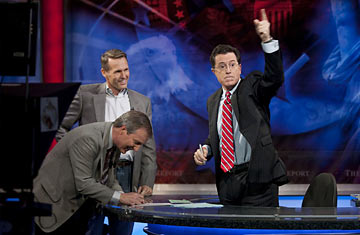
Joined by U.S. Speedskating's Bob Crowley, front left, and Olympic gold medalist Dan Jansen, rear left, Comedy Central host Stephen Colbert announces his show's sponsorship of the U.S. Speedskating team
This story has been updated.
In an icy economy, where can a cash-strapped team training for the Winter Olympics turn for help? Stephen Colbert. Seriously. On Monday night's Colbert Report, the mock-blowhard host of the Comedy Central show announced that he will ask his loyal fans to donate money to the U.S. Speedskating team, whose largest commercial cash sponsor, Dutch bank DSB, just went belly-up. (Colbert snarkily referred to DSB as "Deposit Savings in Bong.") In exchange for the publicity and potential revenue, Colbert Nation logos will be stitched onto the suits of both long-track and short-track skaters during World Cup competitions before the Olympics. Right now, the long-track team is preparing for a competition in Berlin, while the short trackers are in Montreal for a meet. "We are scrambling like crazy to get the logos on the uniforms this weekend," says U.S. Speedskating executive director Bob Crowley.
This isn't some kind of prank, right? "We're not viewing this as a joke at all," says Crowley. Colbert really is throwing U.S. Speedskating a lifeline. The Dutch bank had been the U.S. team's most generous benefactor (speedskating is huge in the Netherlands), but a run on the bank caused DSB to go under in mid-October, leaving U.S. Speedskating with a $300,000 budget shortfall. "The Olympics are our Super Bowl, Masters and Tour de France combined," says Derek Parra, a 2002 speedskating gold medalist who is now one of the coaches for the U.S. team. "And we were scratching our heads at the table, wondering how we are going to get through the rest of the year. It's tough."
Then Colbert's staff saw a story on the DSB sponsorship fallout and pounced. To them, the irony was too delicious: the tentacles of the financial crisis have stung the innocent athletes who aspire to Olympic glory. Plus, the sport offers comic material. "We must ensure that it is America's 38-inch thighs on that medal platform," Colbert said in a release announcing the sponsorship.
So the show's producers called the U.S. Speedskating office in Salt Lake City and the parties quickly hammered out a deal. "My gut reaction was, 'Great,' " says Crowley. "It's a unique sponsorship opportunity, and you know what? It's going to be fun." The market price for sponsorship logos on speedskating suits is $100,000. Colbert will get a logo on the leg and hood of the long-track skaters; on the short-track athletes, the Colbert Nation mark will be stitched on the leg and chest. "A bit embarrassing that our leadership couldn't secure other sponsors three months before the Olympic Games," short-track star Apolo Ohno wrote to TIME in an e-mail. "But BIG UP's to Stephen Colbert for his willingness to help out our nation's greatest athletes. I'm personally 100% in support of his show and think that this is a very good thing. NOW can I get on the show? *wink? haha."
The skaters should probably temper their enthusiasm, because Colbert isn't exactly cutting a check to U.S. Speedskating for $400,000. Over the next few weeks, the show will plug the sport regularly and feature speedskating in a few bits. The team is counting on the generosity of Colbert's audience, in both a down economy and around the holidays, when spare change goes to stocking stuffers. "It's a gamble," Crowley concedes. U.S. Speedskating was in preliminary discussions with a few sponsors, but none were willing to pay $100,000 for the suit space. And with the Olympics just 100 days away, Crowley was left with little choice. "We need to make up lost revenue, and we don't have the comfort of getting that guaranteed check every three months," he says.
Luckily for speedskating, Colbert's audience tends to adopt his causes. He has raised at least $240,000 for the Yellow Ribbon Fund, which assists injured service members and their families. But even if the economics work out, the Colbert stunt could backfire. After all, if your sport becomes too intertwined with a comedy program, does it become a joke? "We talked about that," says Crowley. "We stressed to the Colbert staff that we have exquisite athletes who have trained their entire lives for that Olympic platform. They can't minimize that. They get it, and they recognize that."
Plus, many Olympic speedskaters don't take themselves too seriously. "We're Olympic athletes, and that in itself deserves respect," says Katherine Reutter, a short-track skater who will be competing in her first Olympics in Vancouver. "But we race around in little circles in full-body spandex. There's plenty of stuff to make fun of." And who knows? Those jokes may pay for her medal.
The original version of this story has been updated to include an e-mail from Apolo Ohno.
